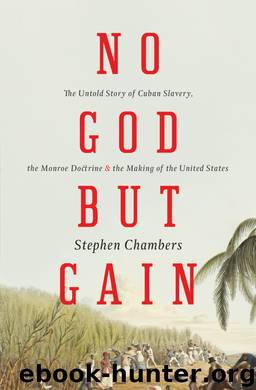No God But Gain by Stephen Chambers

Author:Stephen Chambers
Language: eng
Format: epub
Publisher: Verso Books
“There Is No Longer Any Safety in Business”
By the 1820s, John Latting—the New York merchant and slave trader who had become the U.S. vice consul in Matanzas in 1810—had partnered with a wealthy Virginia merchant named Francis Adams.8 Adams brought a wealth of connections that included his state representative brother-in-law Thomas Newton, Jr., as well as the elite Howland family of Connecticut and New York.9 Adams had used his influence with powerful New York commercial houses to obtain an appointment as U.S. agent to Trieste in 1819, and in 1823, Adams arrived in Matanzas with a similar appointment as a “commercial agent.” He promptly purchased a portion of the nearby Mount Vernon plantation.10 John Latting’s other business partner, Robert Stewart, primarily worked as the commercial house’s representative on the southern coast of the island at Trinidad, where his relative James Stewart was serving as an unrecognized consul.11 The strategy of placing relatives and personal allies in public posts to leverage the diplomatic apparatus of the state to improve the prospects of private commerce remained the typical course for American merchants invested in the Cuba trade. Controlling every public and private aspect of the trade at Matanzas could reduce the risks of the U.S.–Cuba trade, but it could not insulate American investors entirely—particularly when they overreached.
In August 1824, while on a trip to New York, Francis Adams wrote to Edward Spalding that he had received news from St. Petersburg of the low prices listed for sugar in Russia. “I think we have reason to be pleased,” Adams wrote, “that prospects are now discouraging.” Adams planned to use the published account currents of commodity prices in St. Petersburg to buy from Cuban planters at a reduced rate, then time these shipments to match another peak in European demand. “It will keep down the ideas of sugar planters,” he confided to Spalding, “& the price may open low enough to induce orders and enable us to execute them on terms which will be safe to all parties.” Because the Europeans would be unable to calculate demand on sugars purchased in February 1825 (arriving in Europe in May) “before October or November” of 1824, Adams planned “to draw in our advances on planters [and] discontinue shipments on our own acct.”12 Adams intended to force planters to sell at the lower price by calling in the money owed from indebted planters, then hold stockpiles until prices in Europe peaked again. But Adams’s plans quickly imploded.
In late 1824, crops failed in Cuba, and in the Baltic, St. Petersburg was hit by a major storm. Writing to New England from the scene of devastation in Russia in November 1824, the Brothers Cramer detailed the “awfull & dreadfull inundation” in which “thousands of lives & thousands of dwellings [were] swept away.” The damage was as extensive as it was potentially lucrative for the lucky few to have protected stocks of sugar on hand:
The cellars, lower warehouses filled with water, most all the property on the customhouse wharfs damaged,
Download
This site does not store any files on its server. We only index and link to content provided by other sites. Please contact the content providers to delete copyright contents if any and email us, we'll remove relevant links or contents immediately.
| Anthropology | Archaeology |
| Philosophy | Politics & Government |
| Social Sciences | Sociology |
| Women's Studies |
Nudge - Improving Decisions about Health, Wealth, and Happiness by Thaler Sunstein(7687)
The Fire Next Time by James Baldwin(5421)
iGen by Jean M. Twenge(5401)
Adulting by Kelly Williams Brown(4560)
The Sports Rules Book by Human Kinetics(4374)
The Hacking of the American Mind by Robert H. Lustig(4361)
The Ethical Slut by Janet W. Hardy(4235)
Captivate by Vanessa Van Edwards(3834)
Mummy Knew by Lisa James(3676)
In a Sunburned Country by Bill Bryson(3526)
The Worm at the Core by Sheldon Solomon(3475)
Ants Among Elephants by Sujatha Gidla(3452)
The 48 laws of power by Robert Greene & Joost Elffers(3216)
Suicide: A Study in Sociology by Emile Durkheim(3009)
The Slow Fix: Solve Problems, Work Smarter, and Live Better In a World Addicted to Speed by Carl Honore(3001)
The Tipping Point by Malcolm Gladwell(2900)
Humans of New York by Brandon Stanton(2860)
Handbook of Forensic Sociology and Psychology by Stephen J. Morewitz & Mark L. Goldstein(2691)
The Happy Hooker by Xaviera Hollander(2682)
